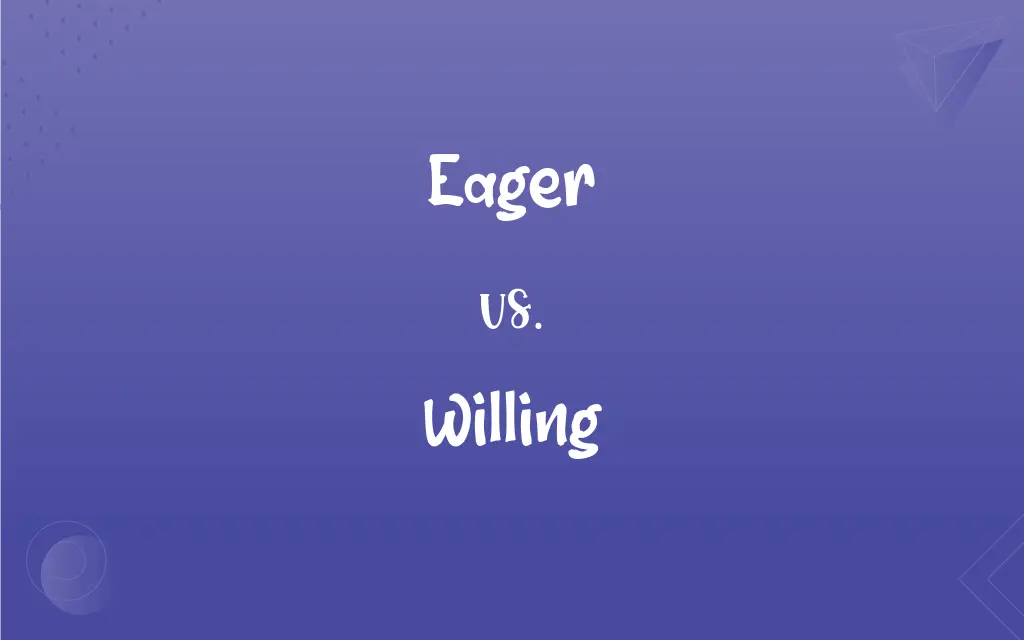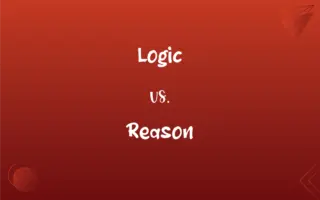Eager vs. Willing: What's the Difference?
Edited by Aimie Carlson || By Janet White || Published on January 18, 2024
"Eager" implies enthusiasm and a keen desire to do something, while "willing" suggests a readiness to do something without objection.

Key Differences
"Eager" denotes a high level of enthusiasm and excitement about doing something. In contrast, "willing" implies a more subdued readiness to engage in an activity, often without the same level of enthusiasm.
An eager person shows a strong, proactive desire to participate or undertake a task, often driven by interest or passion. Conversely, a willing person may not share the same intensity of desire but agrees to do something without reluctance.
Eager individuals often seek out opportunities and are motivated by a deep interest or ambition. Willing individuals, while agreeable to participate, might not actively seek out opportunities but are open to them when presented.
Eagerness can sometimes be impulsive, reflecting a person's intense desire to engage in an activity immediately. Willingness, however, is characterized by a calmer acceptance and readiness to act when needed, without urgency.
"Eager" often conveys an emotional investment in an activity or pursuit, indicating a personal passion or commitment. "Willing," on the other hand, suggests a more rational or pragmatic approach to participation, free from strong emotional impetus.
ADVERTISEMENT
Comparison Chart
Level of Enthusiasm
High enthusiasm and keen interest.
Readiness without necessarily being enthusiastic.
Initiative
Actively seeks out opportunities.
Agrees to participate when opportunities arise.
Emotional Involvement
Often emotionally invested in the activity.
More pragmatic, less emotional investment.
Intensity
Can be intense and passionate.
Calmer, composed attitude.
Impulsiveness
Sometimes impulsive due to strong desire.
Generally not impulsive, more considered.
ADVERTISEMENT
Eager and Willing Definitions
Eager
Having an earnest desire to participate or engage.
The children were eager to play outside after the rain stopped.
Willing
Agreeable to engage in activities as needed.
The team was willing to work overtime to meet the deadline.
Eager
Showing keen enthusiasm to do or experience something.
She was eager to start her new job at the tech company.
Willing
Ready to do something without hesitation or reluctance.
He was willing to help his friend move to a new apartment.
Eager
Demonstrating a high level of excitement about an opportunity.
He was eager to present his findings at the conference.
Willing
Prepared to undertake tasks or obligations without objection.
They were willing to volunteer for the community clean-up.
Eager
Exhibiting intense anticipation or eagerness to act.
She was eager to hear the results of the competition.
Willing
Showing an openness to do something when asked.
She was willing to stay late to finish the project.
Eager
Being ardently enthusiastic about an upcoming event.
Fans were eager for the release of the new album.
Willing
Demonstrating readiness to participate without requiring persuasion.
She was willing to take on extra responsibilities at work.
FAQs
Does "eager" imply impatience?
Not always, but it can suggest an impatient anticipation.
Is "willing" a passive trait?
It's more passive compared to "eager," but still indicates a readiness to act.
Does "eager" suggest a personal interest?
Yes, it often indicates a personal enthusiasm or interest.
Can someone be both eager and willing?
Yes, one can be both enthusiastic (eager) and agreeable (willing) to do something.
Is "eager" suitable for expressing enthusiasm for social events?
Absolutely, it's ideal for expressing excitement about social occasions.
Is "eager" always positive?
Generally, but excessive eagerness can sometimes be perceived as overzealous.
Can "eager" be used in formal contexts?
Yes, it's suitable for both formal and informal contexts.
Does "willing" imply consent?
Yes, it indicates agreement or consent to do something.
Is "willing" enough for a job requirement?
Often yes, as it indicates readiness to undertake job responsibilities.
Can eagerness be negative in a professional setting?
If it leads to hasty decisions or actions, it might be seen negatively.
Can "willing" indicate a lack of enthusiasm?
It might, as it doesn't inherently convey enthusiasm.
Is "willing" associated with obligation?
Sometimes, especially if one agrees to do something out of a sense of duty.
Is "willing" a sign of flexibility?
Yes, it can indicate a flexible and accommodating attitude.
Does "willing" imply a lack of resistance?
Yes, it suggests an absence of resistance or objection.
Does "eager" imply a readiness to act immediately?
Often, it suggests a desire to act soon or immediately.
Does "willing" often accompany compromise?
It can, especially if one agrees to something as a compromise.
Can "eager" be used to describe a lifelong ambition?
Yes, it's suitable for describing long-term passions or ambitions.
Can eagerness affect decision-making?
Yes, excessive eagerness might lead to rushed or poor decisions.
Is "willing" commonly used in legal contexts?
Yes, especially regarding consent or agreement to terms.
How does eagerness affect teamwork?
Positive eagerness can boost team morale, but too much may overwhelm others.
About Author
Written by
Janet WhiteJanet White has been an esteemed writer and blogger for Difference Wiki. Holding a Master's degree in Science and Medical Journalism from the prestigious Boston University, she has consistently demonstrated her expertise and passion for her field. When she's not immersed in her work, Janet relishes her time exercising, delving into a good book, and cherishing moments with friends and family.
Edited by
Aimie CarlsonAimie Carlson, holding a master's degree in English literature, is a fervent English language enthusiast. She lends her writing talents to Difference Wiki, a prominent website that specializes in comparisons, offering readers insightful analyses that both captivate and inform.































































